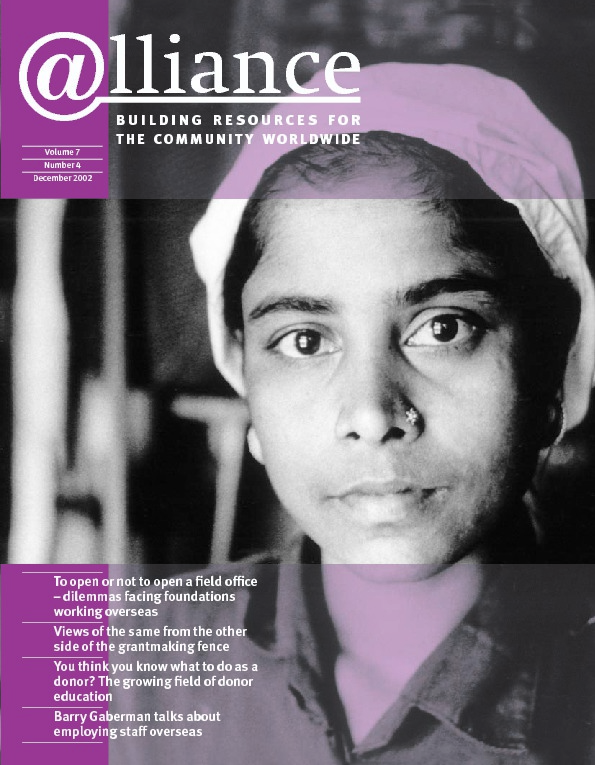Most Russian NGOs do not receive large grants from foundations or corporations, foreign or Russian. In this context it is commonly assumed that they are unable to employ the experienced professionals they need because they cannot offer competitive salaries. This statement proves to be both true and untrue in practice. Professionals join NGOs for many different non-material reasons (including a personal interest in solving a social problem). However, if an NGO does not live up to their expectations, given the lack of material incentive, they are likely to seek new employment elsewhere.
The success and sustainability of Russian NGOs – indeed, NGOs everywhere – depend directly on their staff. Because the majority of Russian NGOs cannot pay competitive salaries, or even guarantee salaries for any length of time, it is important to look carefully at the kinds of motivation (apart from salary) that attract people to work for NGOs.
Gaining skills and experience
Looking at volunteers is a good start. Ekaterina Pechurinko, for instance, a volunteer for the Russian NGO ‘Intertraining’, came to the NGO with the purpose of obtaining practical skills in various areas of social management. Later she got a job in the resource centre, where she was actively involved in developing youth volunteerism. It seems that NGOs that make full use of the energy and curiosity of young volunteers, involving them in the organization’s activities and encouraging them to use their initiative, can end up with managers with appropriate professional skills who share the organization’s values. Professional development training programmes for volunteers play an essential role here.
But there is another side to this. Leaders of many Russian NGOs (including resource centres) say that money spent on professional development for volunteers is often wasted. Once they have obtained the desired skills and experience, young people all too often leave to find jobs in other sectors (state and business) – and maybe NGOs that offer better salaries – and the problems with finding good staff remain.
A desire for social change
Another motive for working for an NGO is a wish to bring about social change of some sort. This is often connected with family circumstances (the parents of a handicapped child might want to work for a relevant NGO). These seem to be the most reliable NGO employees, because their work is based on a personal, non-material interest in making the organization successful (which does not exclude receiving material remuneration for their work).
My five-year experience as head of the Krasnodar Education Information Centre, which had no constant funding sources but regularly attracted local resources and successfully implemented its programme, suggests that these ‘high-principled’ team members allow an NGO to achieve maximum efficiency with minimum expenditure. They are hard to recruit because they are very sensitive to the organization’s public image, its internal rules, and the tasks set for them, but the results of their work justify the time and effort involved in doing so. However, a team consisting entirely of such people may not be ideal because they are rarely able to work for the NGO full-time.
A mixed team
To my mind, the ideal NGO team will consist of people with different motives for working. The most important are desire to achieve a social mission; professional self-realization, eg acquisition of new skills, knowledge and experience; and the desire to work in a team in a pleasant environment. Despite unstable funding, where NGO teams are based on this mix of motives, staff fluctuation tends to be minimal. On the other hand, even a nice comfortable office in the centre of town and a good salary do not guarantee that a valuable employee will not move to a less well paid job with relevant values and meeting his/her professional interests.
If NGOs are to retain good staff, managers must do their utmost to ensure that employees do not become disappointed in the organization. Internal rules that include regular exceptions for management will inevitably lead to disillusion with the NGO’s corporate values. A feeling that the organization is not actually achieving much can also cause disillusion, not just with the individual NGO but with the sector as a whole.
These are highly complex issues, but my NGO management experience suggests that the following will help non-profits hold on to staff even when they cannot offer high salaries:
- strict adherence to the organization’s social mission;
- a clear strategic development plan, disseminated to the whole team;
- a system of encouraging staff members’ and volunteers’ initiatives;
- corporate rules that are accepted by all team members;
- a commitment to seek promotion and personal growth opportunities for all team members.
Svetlana Rubashkina is a PR trainer and consultant who has been working in the Russian NGO sector since 1995. She can be contacted at s_rubashkina@mail.ru





Comments (0)